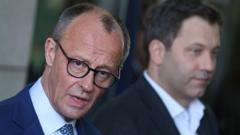In a significant development for Germany's economy, the Bundesbank has reported an unprecedented annual loss of €19.2 billion, signaling profound challenges ahead. Joachim Nagel, president of the central bank, indicated that the nation could be staring at a third consecutive year of economic stagnation. The recent elections, which saw Friedrich Merz of the Christian Democrats poised to form a new government in coalition with the Social Democrats, present a crucial turning point for economic policy in the country.
Germany's Central Bank Reports Historic Loss Amid Economic Stagnation

Germany's Central Bank Reports Historic Loss Amid Economic Stagnation
Germany's economic outlook faces renewed uncertainty as the central bank announces its first loss in over 40 years.
The upcoming government faces hurdles, including a substantial €13 billion budget deficit and numerous structural issues such as high energy costs, bureaucratic complexities, and pressure from international competitors, particularly China. Meanwhile, the Bundesbank's losses are attributed to rising interest rates that have rendered profit generation precarious, erasing the previously enjoyed financial resources that bolstered government budgets.
Despite the bleak outlook, Mr. Nagel remained optimistic about Germany's foundations, citing stable institutions, adaptable businesses, and a skilled workforce as potential catalysts for recovery. However, he emphasized the urgent need for a functioning government and strategic economic policies to revive growth, reflecting the citizens' demand for political reliability in the face of ongoing economic turbulence.
As Germany navigates these multifaceted challenges, the focus will be on how effectively the new government can address the fiscal and operational difficulties while seeking to restore confidence among consumers and investors alike.
In conclusion, the Bundesbank's historic loss serves as a stark reminder of the fragility of the economic landscape in Germany, underscoring an urgent need for decisive governance and innovative economic strategies to inspire growth in the face of adversity.
Despite the bleak outlook, Mr. Nagel remained optimistic about Germany's foundations, citing stable institutions, adaptable businesses, and a skilled workforce as potential catalysts for recovery. However, he emphasized the urgent need for a functioning government and strategic economic policies to revive growth, reflecting the citizens' demand for political reliability in the face of ongoing economic turbulence.
As Germany navigates these multifaceted challenges, the focus will be on how effectively the new government can address the fiscal and operational difficulties while seeking to restore confidence among consumers and investors alike.
In conclusion, the Bundesbank's historic loss serves as a stark reminder of the fragility of the economic landscape in Germany, underscoring an urgent need for decisive governance and innovative economic strategies to inspire growth in the face of adversity.





















